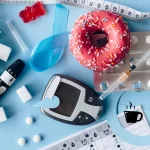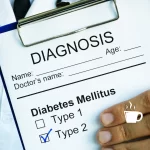Physical Address
304 North Cardinal St.
Dorchester Center, MA 02124

Diabetes is a health condition that affects millions of people worldwide. It is a chronic disease characterized by high levels of glucose in the blood, resulting from either insufficient production of insulin by the body or the body’s inability to effectively use the insulin it produces. Recognizing the early symptoms of diabetes is crucial for effective diagnosis and treatment. In this article, we will explore the common symptoms of diabetes and the importance of seeking medical help when identifying these signs.
Diabetesis a metabolic condition that affects how the body uses glucose (sugar) in the blood. Insulin, a hormone produced by the pancreas, is essential for transporting glucose from the bloodstream into the body’s cells, where it is used as a source of energy. In type 1 diabetes, the body does not produce enough insulin, while in type 2 diabetes, the body’s cells become resistant to insulin or the pancreas does not produce enough insulin.
It is important to be aware of these symptoms and seek medical help if you or someone you know is experiencing any of them. Early diagnosis of diabetes is essential to prevent serious complications such as heart disease, stroke, kidney problems, nerve damage, and vision problems.
While some risk factors for developing diabetes, such as family history and genetic predisposition, cannot be modified, there are measures that can help prevent and manage the disease:
– Maintain a Healthy Weight: Maintaining a healthy weight through a balanced diet and regular physical activity can help prevent type 2 diabetes and control type 1 and type 2 diabetes.
– Healthy Eating: A diet rich in fruits, vegetables, whole grains, lean proteins, and healthy fats can help control blood glucose levels.
– Regular Physical Activity: Regular physical activity can help improve insulin sensitivity and control blood glucose levels.
– Regular Blood Glucose Monitoring: People with diabetes should regularly monitor their blood glucose levels and follow the treatment plan established by their doctor.
– Proper Medical Treatment: It is important to follow the treatment plan established by the doctor, which may include medications, insulin, lifestyle changes, and regular monitoring.
Recognizing the early symptoms of diabetes is crucial for effective diagnosis and treatment. If you or someone you know is experiencing symptoms such as increased thirst, frequent urination, excessive hunger, fatigue, unexplained weight loss, blurry vision, recurrent infections, slow healing of wounds, or tingling or numbness in the hands and feet, it is important to seek medical help. With early diagnosis and an appropriate treatment plan, it is possible to prevent serious complications and live well with diabetes. Always remember to adopt a healthy lifestyle and follow your doctor’s guidance to control diabetes and maintain a good quality of life.




